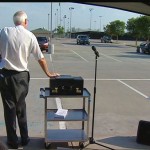 I was pretty impressed with this pastor who has started a ‘Drive In’ church. Wasn’t so much impressed that he’s doing a drive in church, that seems rather silly to me. I was impressed that he is choosing to do sermons outside in the Texas heat wave this summer. That is just insane.
I was pretty impressed with this pastor who has started a ‘Drive In’ church. Wasn’t so much impressed that he’s doing a drive in church, that seems rather silly to me. I was impressed that he is choosing to do sermons outside in the Texas heat wave this summer. That is just insane.
Vans and trucks drove into the parking lot of Lovejoy High School to be part of “Sanctuary Under the Sky,” Rev. David Ray’s new drive-in church.
“The sound is transmitted over the car radio so they just tune into the frequency that it’s set to. They can hear, they’re encouraged to participate. Everything that the congregation is asked to do is printed in the bulletin,” said Ray.
Ray, pastor of Presbyterian Church of the Master, stands in the parking lot conducting the service as churchgoers watch through their dashboard windows.
What caught me by surprise with this story is that he was a Presbyterian pastor. Not the normal kind the norm of worship for a mainline minister. So as with any bored moment I went and looked up ‘drive in church‘ and come to realize, he doesn’t actually know how to look for others doing the same thing (claimed in article that he’s only one doing this that he’s aware of), because it seems other churches have driveinchurch.net websites. Turns out a Disciples of Christ church has been at this for almost 50 years. In their history this is their reasoning for a drive in church.
The purpose of these services was to reach a large number of people with the good news including tourists, the physically challenged and provide an opportunity for the whole family to worship together. The Drive-In Church is new and different, yet it is deeply spiritual and reverently worshipful. As our Pastor was quoted in The Washington Post in a recent article on our church. “We worship outdoors, by the sea as did Jesus.”
So has me wondering, is this like the first emergent / missional / emerging / post-modern church?
Or maybe, is the car such a comfort buffer that we prevent ourselves from ever actually being community because we never get in proximal distance to one another?

